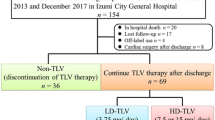Abstract
Purpose
Over half of all admitted acute decompensated heart failure (ADHF) patients have renal failure. Although diuretics represent the mainstay of treatment strategy even in this population, there are unmet needs for safer and more effective treatment. Tolvaptan is a vasopressin-2 receptor antagonist, and we hypothesized that adding tolvaptan to standard diuretic therapy would be more effective in ADHF patients with renal function impairment.
Methods
The Answering question on tolvaptan’s efficacy for patients with acute decompensated heart failure and renal failure (AQUAMARINE) is a multicenter, randomized controlled clinical trial, which will enroll 220 patients from 17 hospitals in Japan. ADHF patients whose estimated glomerular filtration rate is above 15 and below 60 mL/min/1.72 m2 will be randomly assigned within 6 h after admission to usual care with furosemide or tolvaptan add-on therapy. Primary endpoint is achieved urine output within 48 h. Secondary endpoints include dyspnea relief measured by 7-points Likert scale, incidence of worsening renal function, dose of furosemide used within 48 h, and changes of brain natriuretic peptide.
Conclusion
This study is the first multicenter study in Japan to evaluate clinical effectiveness of tolvaptan add-on therapy in ADHF patients with renal failure. The results of this study address the treatment strategy of this high-risk population (UMIN Clinical Trial Registry Number: UMIN000007109).

Similar content being viewed by others
References
Rosamond W, Flegal K, Friday G, et al. Heart disease and stroke statistics—2007 update: a report from the American Heart Association Statistics Committee and Stroke Statistics Subcommittee. Circulation. 2007;115:e69–e171.
Sato N, Kajimoto K, Keida T, et al. Clinical features and outcome in hospitalized heart failure in Japan (from the ATTEND Registry). Circ J. 2013;77:944–51.
Ronco C, Haapio M, House AA, Anavekar N, Bellomo R. Cardiorenal syndrome. J Am Coll Cardiol. 2008;52:1527–39.
Sarraf M, Masoumi A, Schrier RW. Cardiorenal syndrome in acute decompensated heart failure. Clin J Am Soc Nephrol. 2009;4:2013–26.
Thomson MR, Nappi JM, Dunn SP, Hollis IB, Rodgers JE, Van Bakel AB. Continuous versus intermittent infusion of furosemide in acute decompensated heart failure. J Card Fail. 2010;16:188–93.
Wang DJ, Gottlieb SS. Diuretics: still the mainstay of treatment. Crit Care Med. 2008;36:S89–94.
Kon V, Yared A, Ichikawa I. Role of renal sympathetic nerves in mediating hypoperfusion of renal cortical microcirculation in experimental congestive heart failure and acute extracellular fluid volume depletion. J Clin Invest. 1985;76:1913–20.
Miyazaki T, Fujiki H, Yamamura Y, Nakamura S, Mori T. Tolvaptan, an orally active vasopressin V(2)-receptor antagonist—pharmacology and clinical trials. Cardiovasc Drug Rev. 2007;25:1–13.
Costello-Boerrigter LC, Smith WB, Boerrigter G, et al. Vasopressin-2-receptor antagonism augments water excretion without changes in renal hemodynamics or sodium and potassium excretion in human heart failure. Am J Physiol Ren Physiol. 2006;290:F273–8.
Matsuo S, Imai E, Horio M, et al. Revised equations for estimated GFR from serum creatinine in Japan. Am J Kidney Dis. 2009;53:982–92.
Matsue Y, Suzuki M, Seya M, et al. Tolvaptan reduces the risk of worsening renal function in patients with acute decompensated heart failure in high-risk population. J Cardiol. 2013;61:169–74.
Butler J, Forman DE, Abraham WT, et al. Relationship between heart failure treatment and development of worsening renal function among hospitalized patients. Am Heart J. 2004;147:331–8.
Forman DE, Butler J, Wang Y, et al. Incidence, predictors at admission, and impact of worsening renal function among patients hospitalized with heart failure. J Am Coll Cardiol. 2004;43:61–7.
Owan TE, Hodge DO, Herges RM, Jacobsen SJ, Roger VL, Redfield MM. Secular trends in renal dysfunction and outcomes in hospitalized heart failure patients. J Card Fail. 2006;12:257–62.
Matsuzaki M, Hori M, Izumi T, Fukunami M. Efficacy and safety of tolvaptan in heart failure patients with volume overload despite the standard treatment with conventional diuretics: a phase III, randomized, double-blind, placebo-controlled study (QUEST study). Cardiovasc Drugs Ther. 2011;25 Suppl 1:S33–45.
Watanabe K, Dohi K, Sugimoto T, et al. Short-term effects of low-dose tolvaptan on hemodynamic parameters in patients with chronic heart failure. J Cardiol. 2012;60:462–9.
Gheorghiade M, Konstam MA, Burnett Jr JC, et al. Short-term clinical effects of tolvaptan, an oral vasopressin antagonist, in patients hospitalized for heart failure: the EVEREST Clinical Status Trials. JAMA. 2007;297:1332–43.
Konstam MA, Gheorghiade M, Burnett Jr JC, et al. Effects of oral tolvaptan in patients hospitalized for worsening heart failure: the EVEREST Outcome Trial. JAMA. 2007;297:1319–31.
Cuffe MS, Califf RM, Adams Jr KF, et al. Short-term intravenous milrinone for acute exacerbation of chronic heart failure: a randomized controlled trial. JAMA. 2002;287:1541–7.
Mebazaa A, Nieminen MS, Packer M, et al. Levosimendan vs dobutamine for patients with acute decompensated heart failure: the SURVIVE Randomized Trial. JAMA. 2007;297:1883–91.
Mebazaa A, Pang PS, Tavares M, et al. The impact of early standard therapy on dyspnoea in patients with acute heart failure: the URGENT-dyspnoea study. Eur Heart J. 2010;31:832–41.
Weintraub NL, Collins SP, Pang PS, et al. Acute heart failure syndromes: emergency department presentation, treatment, and disposition: current approaches and future aims: a scientific statement from the American Heart Association. Circulation. 2010;122:1975–96.
Matsuzaki M, Hori M, Izumi T, et al. Effects of tolvaptan on volume overload in Japanese patients with heart failure: results of a phase II, multicenter, randomized, double-blind, placebo-controlled, parallel-group study. Cardiovasc Drugs Ther. 2011;23 suppl 1:S19–31.
Acknowledgments
AQUAMARINE is supported by a Multicenter Clinical Research Grant from the Japan Heart Foundation. Clinical trial registration ID assigned by the University hospital Medical Information Network (UMIN) as UMIN000007109.
Author information
Authors and Affiliations
Corresponding author
Rights and permissions
About this article
Cite this article
Matsue, Y., Suzuki, M., Nagahori, W. et al. Clinical Effectiveness of Tolvaptan in Patients with Acute Decompensated Heart Failure and Renal Failure: Design and Rationale of the AQUAMARINE Study. Cardiovasc Drugs Ther 28, 73–77 (2014). https://doi.org/10.1007/s10557-013-6491-8
Published:
Issue Date:
DOI: https://doi.org/10.1007/s10557-013-6491-8




